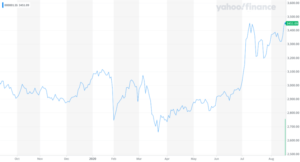Part one of a two-part series.
In China, the country that brought the world COVID-19, the stock market has been soaring. In August, the China Shanghai Composite Stock Market Index was up 29% from March.
China has been telling the world that it has conquered the coronavirus and, apparently, analysts and investors believe what they hear. They believe, as one example, that China’s economy was barely even nicked by the pandemic, even though the rest of the world is in a recession.
The Bureau of Economic Analysis announced that the U.S. economy contracted 32.9% for the second quarter, but China’s National Bureau of Statistics claims the Chinese economy grew by 3.2% during that period.
While the number of COVID-19 cases and deaths continue to increase in the United States and throughout the world, China’s Communist Party has been reporting that it has had 14 new cases of COVID-19 since March. That’s a stretch of six months.
Does that sound right to you? China has the world’s largest population — 1.4 billion people. It was the source of COVID-19, which began in Wuhan. Yet it claims to have had only 84,981 cases of COVID-19 with 4,634 deaths.
In comparison, the United States, with a population that’s less than a fourth of the size of China’s, has reported nearly six million cases of COVID-19 and more than 181,000 deaths. In percentages, 0.18% of the population has contracted COVID-19. In China, based on the official numbers, 0.0000607% of the population has contracted COVID-19.
China also claims to have administered more than 90 million tests. Even if everyone who was reported to have COVID-19 had been tested, there would be less than one person testing positive for every 1,000 tests. In the U.S., where about 77 million tests have been administered, 9% of Americans are testing positive.
Any statistician, as well as U.S. intelligence, would tell you that the Communist Party is lying.
If China were telling the truth, it would mean that China has not only developed a foolproof vaccine, but managed to produce enough of it to inoculate its population and administer it to 1.4 billion people living in an area covering 3.7 million square miles. If China produced such a miracle vaccine, the Communist Party would be bragging about it to the rest of the world (like Russia) and selling the vaccine at exorbitant prices.
Recall, too, China’s initial reaction to the discovery of COVID-19, which we’ve previously written about. When Dr. Li Wenliang warned his colleagues about the coronavirus he had discovered, he was “called before a disciplinary council of the local Communist Party and forced to repent and confess, in writing, that he had spread rumors harmful to the glory of the Party.”
We also noted that Communist leaders shut down news of the virus on social media, and that journalists and activists who tried to inform the public or who criticized the government’s response either ended up in jail or disappeared. Western journalists were expelled.
And it was the failure of China’s leaders to inform other countries about the severity of COVID-19 or to take action to prevent its spread outside of China that caused the pandemic.
Other Offenses
Of course, lying is the least of the Communist Party’s offenses. The Chinese government has created concentration camps for an estimated one million Uighur Muslims. It harvests the organs of Falun Gong prisoners of conscience and others (see the movie, “Human Harvest”), and it tortures and murders innocent people. China steals American intellectual property, hacks American computers and has created the world’s largest and most sophisticated online censorship operation.
But back to investing. Are Chinese stocks going up because the companies listed are performing so well? Or because the Chinese state-run news agency Xinhua says they are performing well?
Consider that Chinese companies frequently have their IPOs in the United States. This year’s IPOs include Shaghai’s Agora, a video and voice communication platform supplier, whose stock soared 153% in its first week, making it the best IPO in the U.S. since 2019, according to Renaissance Capital.
While the number of American start-ups going public has fallen dramatically, due to excessive regulation, Chinese companies are able to list without providing audited financials.
The Public Company Accounting Oversight Board (PCAOB) is not allowed to inspect the audits of Chinese companies “even when the auditors are affiliates of U.S. accounting firms like Deloitte and KPMG,” according to The Wall Street Journal.
This spring, an audit of China’s Luckin’ Coffee uncovered that its sales numbers after it went public were fabricated. How many other fraudulent financials would be uncovered if audit inspections were allowed?
Under a plan recommended by the Trump administration, Chinese firms listed on the New York Stock Exchange and Nasdaq Stock Market would have to comply with U.S. audit requirements by 2022 or give up their listings on those exchanges. The U.S. Senate unanimously passed a bill in May banning Chinese companies from U.S. exchanges if they don’t give the PCAOB access to their independent audits, and the President’s Working Group on Financial Markets endorsed the policy in August.
In the meantime, China has eased its regulations for initial public offerings (IPOs). On Aug. 24, as a result of the deregulation, 18 Chinese tech companies saw their stock prices increase by an average of more than 200%.
So there’s plenty of money to be made from investing in China. But, given the country’s human rights abuses and the untrustworthiness of its financial information, count me out.

